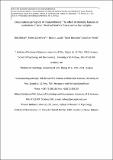Files in this item
Cross-cultural perception of trustworthiness : the effect of ethnicity features on evaluation of faces' observed trustworthiness across four samples
Item metadata
| dc.contributor.author | Birkas, Bela | |
| dc.contributor.author | Dzhelyova, Milena | |
| dc.contributor.author | Labadi, Beatrix | |
| dc.contributor.author | Bereczkei, Tamas | |
| dc.contributor.author | Perrett, David Ian | |
| dc.date.accessioned | 2015-05-31T23:11:07Z | |
| dc.date.available | 2015-05-31T23:11:07Z | |
| dc.date.issued | 2014-06 | |
| dc.identifier | 136515696 | |
| dc.identifier | 2c9ce646-bc76-4d10-af9a-2ed68df510eb | |
| dc.identifier | 84901832868 | |
| dc.identifier | 000340012900011 | |
| dc.identifier.citation | Birkas , B , Dzhelyova , M , Labadi , B , Bereczkei , T & Perrett , D I 2014 , ' Cross-cultural perception of trustworthiness : the effect of ethnicity features on evaluation of faces' observed trustworthiness across four samples ' , Personality and Individual Differences , vol. 69 , pp. 56 . https://doi.org/10.1016/j.paid.2014.05.012 | en |
| dc.identifier.issn | 0191-8869 | |
| dc.identifier.other | ORCID: /0000-0002-6025-0939/work/64361000 | |
| dc.identifier.uri | https://hdl.handle.net/10023/6718 | |
| dc.description | Funding: Hungarian Scientific Research Council (Nr.101762) (TB) | en |
| dc.description.abstract | People are able to recognize faces from their own ethnic group more easily than faces from other ethnicities. Ethnicity information also easily activates perceptual biases; therefore, the goal of the present study was to examine how ethnicity characteristics affect trustworthiness decisions. We compared the trustworthiness judgments of four samples (two Caucasian and two Asian) to facial images varying along both – trustworthiness level (high, medium and low) and ethnicity (African, Caucasian, South Asian and East Asian). Results showed that trust perception generalized across face ethnicity. More importantly, we found differences in the trustworthiness judgments of other-ethnicity faces between the four samples. Only Caucasian participants showed a bias pro own-ethnicity, especially Hungarian participants when judging medium or low trustworthy looking faces. On contrary, the two Asian samples showed no such bias. Further investigation of the positive own-ethnicity bias suggested that for Hungarian participants, when there are no positive facial expression cues to evaluate, negative ethnicity stereotypes can influence social judgments of faces. Furthermore, this positive bias was highlighted as increased vigilance towards differences in facial cues conveying trustworthiness in other ethnicities coupled with a reduced ability to detect such cues in own-ethnicity faces. | |
| dc.format.extent | 61 | |
| dc.format.extent | 480123 | |
| dc.language.iso | eng | |
| dc.relation.ispartof | Personality and Individual Differences | en |
| dc.subject | Trustworthiness | en |
| dc.subject | Facial ethnicity features | en |
| dc.subject | Own-ethnicity bias | en |
| dc.subject | Facial evaluation | en |
| dc.subject | BF Psychology | en |
| dc.subject | RC0321 Neuroscience. Biological psychiatry. Neuropsychiatry | en |
| dc.subject.lcc | BF | en |
| dc.subject.lcc | RC0321 | en |
| dc.title | Cross-cultural perception of trustworthiness : the effect of ethnicity features on evaluation of faces' observed trustworthiness across four samples | en |
| dc.type | Journal article | en |
| dc.contributor.institution | University of St Andrews. School of Psychology and Neuroscience | en |
| dc.contributor.institution | University of St Andrews. Institute of Behavioural and Neural Sciences | en |
| dc.contributor.institution | University of St Andrews. Centre for Social Learning & Cognitive Evolution | en |
| dc.identifier.doi | https://doi.org/10.1016/j.paid.2014.05.012 | |
| dc.description.status | Peer reviewed | en |
| dc.date.embargoedUntil | 2015-06-01 |
This item appears in the following Collection(s)
Items in the St Andrews Research Repository are protected by copyright, with all rights reserved, unless otherwise indicated.

